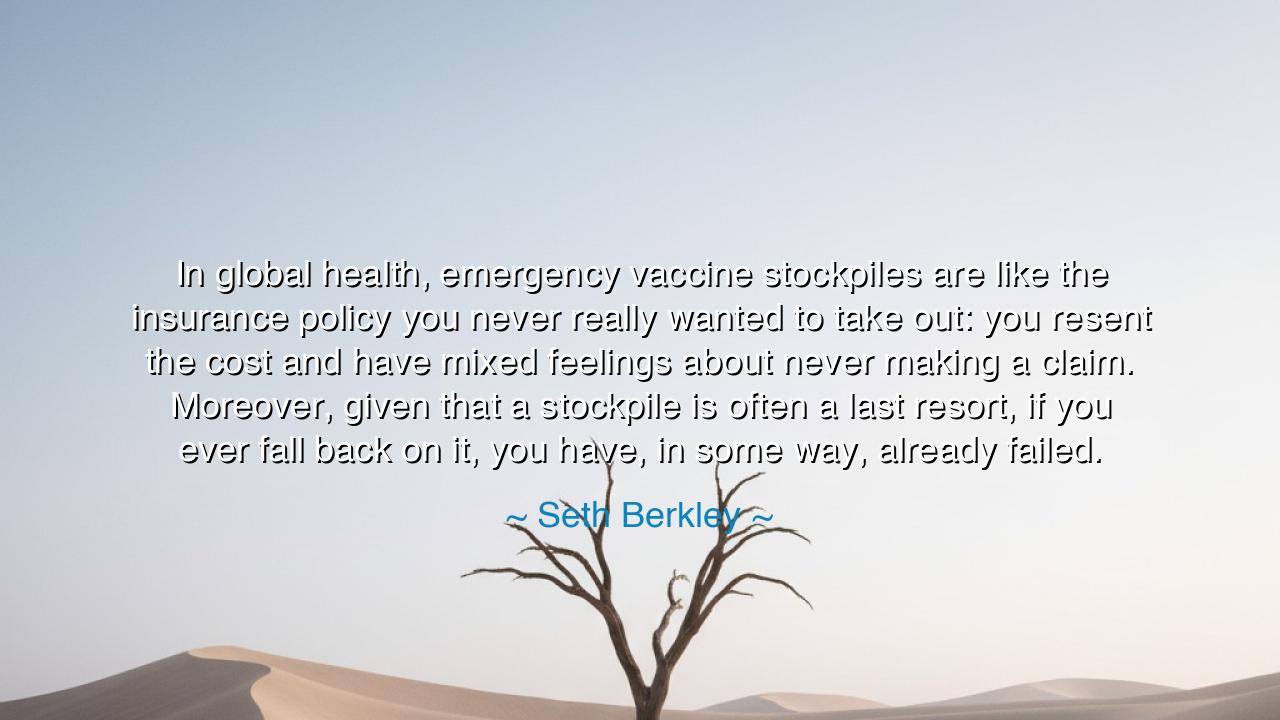
In global health, emergency vaccine stockpiles are like the
In global health, emergency vaccine stockpiles are like the insurance policy you never really wanted to take out: you resent the cost and have mixed feelings about never making a claim. Moreover, given that a stockpile is often a last resort, if you ever fall back on it, you have, in some way, already failed.






In the solemn and insightful words of Seth Berkley, physician and champion of global vaccination, there echoes a truth both practical and philosophical: “In global health, emergency vaccine stockpiles are like the insurance policy you never really wanted to take out: you resent the cost and have mixed feelings about never making a claim. Moreover, given that a stockpile is often a last resort, if you ever fall back on it, you have, in some way, already failed.” These words are not merely about medicine — they are about the human condition, about the uneasy balance between foresight and reaction, prevention and response. Berkley, who has spent decades battling the world’s most devastating diseases, reminds us that preparedness, though invisible and often thankless, is the cornerstone of civilization. His message is not just for doctors or policymakers — it is for all who wish to guard the fragile flame of life against the storms of uncertainty.
The origin of this quote lies in Berkley’s long work with organizations like Gavi, the Vaccine Alliance, which coordinate global immunization efforts and maintain emergency vaccine stockpiles against outbreaks of deadly diseases like Ebola, yellow fever, and cholera. These stockpiles — vast reserves of life-saving doses stored around the world — stand as humanity’s safety net. Yet, as Berkley observes, they also carry a paradox: to use them is to acknowledge that our systems of prevention have failed. If the fire burns the village, it is already too late to admire the wisdom of the well we dug. Thus, he compares these stockpiles to insurance — a necessary expense that offers no joy, a shield we hope never to raise, a testament to both our vigilance and our vulnerability.
In his words, we hear the wisdom of the ancients — for this idea of reluctant preparedness has echoed through the ages. The generals of Rome built fortifications not because they desired battle, but because they knew peace must be defended. The farmers of the Nile stored grain not because they wished for famine, but because they knew the flood would one day fail. So too does Berkley teach us that preparation is both burden and virtue — an act of humility before the unpredictable forces of nature. To prepare is to admit that we are not gods, that disease and disaster may strike without warning, and that wisdom lies not in denial, but in readiness.
Yet his reflection goes deeper still. In saying that “if you fall back on the stockpile, you have already failed,” Berkley does not condemn those who respond to crisis; he mourns the lost opportunity to prevent it. He reminds us that the highest form of strength lies not in reaction, but in anticipation. For every vial drawn from a stockpile, there has been a lapse — in surveillance, in response, in the global cooperation that might have stopped the outbreak before it began. The stockpile, then, is both salvation and sorrow — a sign of human ingenuity, but also a mirror reflecting the gaps in our foresight.
History has given us bitter examples of this truth. When Ebola struck West Africa in 2014, the world’s response came too late. Thousands perished before vaccines and aid could reach those in need. Later, when the COVID-19 pandemic swept across continents, the world again faced the same test — and again, our preparation proved uneven. Nations hoarded vaccines; others waited in vain. It was only through desperate mobilization that the tide began to turn. In these tragedies, we see what Berkley meant: the stockpile, though heroic in purpose, is evidence of a deeper failure — of systems that should have guarded life before the outbreak ever took hold.
Yet in his words, there is no bitterness — only resolve. Berkley’s vision is not to abandon the stockpile, but to inspire wisdom in prevention. He reminds us that true preparedness is not the storing of things, but the cultivation of systems: strong healthcare, equitable distribution, scientific trust, and the will to act before crisis demands it. The lesson, then, is both pragmatic and moral — that responsibility is not measured by our reaction to disaster, but by our effort to avert it. In health, in governance, in our personal lives, this truth endures: foresight is the highest form of compassion.
And so, children of a world both fragile and mighty, heed Seth Berkley’s wisdom. Do not despise the cost of preparation, for its price is far less than the toll of neglect. Build your reserves — of vaccines, of virtue, of wisdom — not because you wish to use them, but because to lack them in the hour of need is to invite ruin. Let your actions today guard the lives of tomorrow. For when you prepare not out of fear, but out of love — when your readiness becomes an offering to the future — you have transcended the tragedy of failure. You have become, in your own way, a healer of the world.






AAdministratorAdministrator
Welcome, honored guests. Please leave a comment, we will respond soon